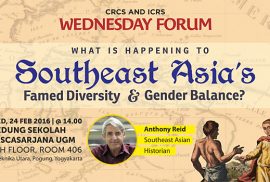Abstract
Among Southeast Asia’s many distinctive features, some would say stereotypes, there are two which I have helped to build. The first is its great diversity of language, religion, mode of production and political organization, where ‘empires failed to unify’ and stateless hunter-gatherers may still be found. The second is the economic autonomy of women, who had their own secure share in production (planting, harvesting, textiles, pottery, marketing) and therefore an almost uniquely strong position in sexual politics. As an historian, I was excited to demonstrate both features in the era before modernity entranced the region around 1900. Today’s students are entitled to ask, ‘Then what happened?’ Does modernity require nationalist homogeneity and patriarchy? Or was the region seduced by a peculiar ‘Victorian’ model of colonial modernity that could never really succeed in such a context?
Speaker
Anthony Reid is a Southeast Asian historian, once again based at the Australian National University after serving as founding Director of the Center for Southeast Asian Studies at UCLA (1999-2002) and of the Asia Research Institute at NUS, Singapore (2002-7). Since 2004 he has been increasingly interested in the impact of natural disasters on Southeast Asian history. His books include The Contest for North Sumatra: Aceh, the Netherlands and Britain, 1858-98 (1969); The Indonesian National Revolution (1974); The Blood of the People: Revolution and the End of Traditional Rule in Northern Sumatra (1979); Southeast Asia in the Age of Commerce, c.1450-1680 (2 vols. 1988-93); An Indonesian Frontier: Acehnese and other histories of Sumatra (2004); Imperial Alchemy: Nationalism and political identity in Southeast Asia (2010); To Nation by Revolution: Indonesia in the 20th Century (2011); and A History of Southeast Asia: Critical Crossroads (2015).
Arsip:



